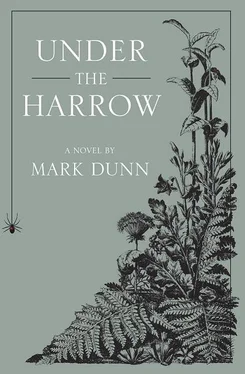I had finished with my watering of all of Charlotte’s many flowers and plants, and had taken a meal from my sister-in-law’s larder of foods that had not yet moulded or spoilt, and now I was prepared to relax a bit and draw a book from that part of my father’s small library that had been oddly bequeathed to my older brother, the infrequent reader, if I could only discover the whereabouts of the candles. It would be in keeping with Charlotte’s provident nature to have taken them all with her to her friend Miss Snigsworth’s house in Hungerford, for “Economy” could verily have been Charlotte’s middle name. You would take that name as well, if you had been married to my perpetually insolvent brother.
But then I found them…in a drawer in a little table in the drawing room. I huzzahed not once but twice, for my evening was now set. I could settle back and enjoy the quiet of this sleepy, tranquil village, and the quiet of my brother’s dark and empty house, which was a rare and welcome contrast to the bustle and hustle of Milltown, a veritable city (in Dinglian terms) that did not close its shutters until well past ten o’clock post meridiem. And even in the depths of night there one might still find oneself awakened by the hourly peal of the clock atop Burghers’ Hall or the mangled harmonising of late-night revelers stumbling home from the town’s various public houses. There was also the barking and mewing soliloquies and colloquies and veritable choruses of every furred and four-footed creature turned out upon these warm summer nights, each animal quite adept at dodging both boot and bolster chucked from the window of a slumberdeprived bedchamber.
I lifted the candle to light the bookshelf and peruse its Dinglian volumes, some of which I hadn’t visited since childhood: Oliver Twist, the Man; Acrostics for Every Name and Occasion; Jiniwin’s Jest Book; and one of my personal favourites, which had inspired me, in part, to become a writer, The Curious Bogleman and other Tales of Dinglian Horror . Yet I left all of these volumes untouched upon the shelf, and took down, instead, my mother’s sketch pad. I hadn’t seen it for several years and thought for a time that Gus had lost it in his family’s latest removal or that Charlotte had accidentally put it out with the rubbish.
I settled into my brother’s easy chair (which had formerly belonged to my father) and opened the pad that was more book than pad, in actuality, its thick leaves carefully stitched and bound together with a proud artisan’s hand. My youth lived upon these pages. And Gus’s as well. My mother was a gifted artist and the likenesses she created most striking. They rejuvenated long put-by memories of a relatively happy youth, though my father did not make the season altogether perfect given his frequent bursts of anger and frustration at a world much too small to contain him. But where Papa dropt a shadow, Mama shone a light, and there was sufficient equilibration betwixt the two to buoy my childhood to an adequate level of normalcy.
However, I wasn’t long in the chair before I heard something outside the house not at all representative of the customary nocturnal quietude of this village. It was a woman’s raised voice: serious, admonishing and a little frantic. I rose quickly from the chair and went to the window.
There before me was the proprietor of that voice — a young woman, standing in the middle of the dusty twilight-shaded lane, facing a shaggy dog of some size, the creature growling and bearing its gums in an overtly intimidating manner.
“Now you stay right there! Right where you are, buster!” said the woman.
From the window, I called, “Oho! Pepper! Pepper! Withdraw this instant, boy!”
The shaggy Pepper turned his head, and recognising a familiar face in the window, left off growling and gum-bearing, and began to wag his thick tail. I stepped out onto the porch and was instantly greeted by the great creature with happy paws upon my chest and a wet tongue upon my chin.
“He really is quite friendly. You needn’t have worried,” I called to the frightened young woman in the lane.
“If that’s the case,” she rejoined, “then you and I have different definitions for the word ‘friendly.’ Another half-minute and I would have been his dinner.”
“That’s nonsense,” said the Widow Chillip, standing upon her own front porch next door. “Come, Pepper! Supper!”
“I walk down this road every night, madam,” said the young woman, “and your Pepper has always let me pass. But to-night he has decided to become quite territorial.”
“Mayhap, Pepper didn’t recognise you in the gloaming,”said the Widow Chillip. She slapped her side to bring her dog to heel. “As Mr. Trimmers has already said, he’s quite the friendly dog — that is, unless he’s provoked.”
The young woman, whose hair, even in the dying atoms of daylight, appeared quite red, placed both hands upon her hips in a rather disputatious posture. “I didn’t provoke your dog, madam. I was merely walking down the road, minding my own business.”
“Mayhap it is your medical bag. You’re the nurse at Bedlam, are you not? Do you always carry it with you? Mayhap it frightened Pepper. Sometimes the veterinarian Mr. Smallweed comes with just such a bag as that, and he inevitably produces something with which to poke and perturb poor Pepper. That is my theory. Goodnight to you both and I apologise to you in earnest, Miss Bedlam Nurse, for whatever inconvenience Pepper has caused you.” With this, the Widow Chillip spun theatrically upon her heel and led her shaggy, scraggly, small horse of a dog into her cottage.
The Bedlam nurse and I could not contain ourselves and smiled in concert over the comical display. I stepped down from the porch and the nurse came toward me so that we should meet in the middle of my brother and sister-in-law’s brick walk, bordered by colourful flowers of the season that stood a little straighter from the tall drink of water I had just delivered to them.
“I am Ruth Wolf,” the woman said, extending her hand to shake, “and Mrs. Chillip is correct — I work as a nurse at Bethlehem Hospital.”
“Frederick Trimmers. This is my brother’s house. He and his wife have gone to spend a few days in Hungerford.”
“Yes, I’ve been to Hungerford. It’s slightly smaller than Fingerpost, isn’t it?”
“Not much more than a few cottages and a communal well, really. Are you in a hurry to get yourself home? I could make us tea.”
“I’m actually in no great hurry to get home per se. Only to get off my feet. If there is something upon which I may sit in your brother’s house, I should enjoy a little company that isn’t bedridden or medical by profession. Although, if you are the Frederick Trimmers whose name receives mention now and then at all of the hospitals where I work — for I am on call at the Lung Hospital and the Milltown Respectable Hospital as well—”
“But not the Indigents’ Hospital?”
“Not officially, although I do make visitations there on my own twice or thrice a week. I was just going to say that your name is not unfamiliar to me. I believe that you are instrumental in preparing the Medical Review Board’s report each year.”
“‘Instrumental’ may be overstating my duties,” I said, holding the door open for Miss Wolf to enter. “I am but a lowly scribe. At all events, your name is quite known to me as well.”
My brother and sister-in-law’s sitting room was dark now, the single candle beside my reading chair doing little to illuminate the rest of the room, and so I took a moment to go about and light and place a candle here and there to give more light.
“Has your brother not an oil lamp of some sort?”
“He has the lamp. Just not the oil. You might have noticed that the price of oil has risen a bit in the last several months, and he and Charlotte can no longer afford it. Well, I shouldn’t speak of my brother behind his back. He and my sister-in-law do what they can to get by. Who is to say that I wouldn’t be in similar straits if I had two additional mouths to feed? Well, one extra mouth in truth, at least for right now.”
Читать дальше












